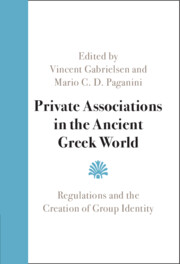Book contents
- Private Associations in the Ancient Greek World
- Private Associations in the Ancient Greek World
- Copyright page
- Contents
- Tables
- Contributors
- Preface
- Abbreviations
- Chapter 1 Associations’ Regulations from the Ancient Greek World and Beyond
- Chapter 2 Admission Procedures and Financial Contributions in Private Associations
- Chapter 3 Regulations on Absence and Obligatory Participation in Ancient Associations
- Chapter 4 The Place of Purity
- Chapter 5 Associations and Place
- Chapter 6 Greek thorybos, Roman eustatheia
- Chapter 7 Private Affairs in a Public Domain
- Chapter 8 A World Full of Associations
- Chapter 9 Ordo corporatorum
- Chapter 10 Rules and Regulations of Associations
- Chapter 11 Conclusion
- Bibliography
- Subject Index
- Index Locorum
Chapter 9 - Ordo corporatorum
The Rules of Roman Associations and the collegia at Ostia in the Second and Third Centuries AD
- Private Associations in the Ancient Greek World
- Private Associations in the Ancient Greek World
- Copyright page
- Contents
- Tables
- Contributors
- Preface
- Abbreviations
- Chapter 1 Associations’ Regulations from the Ancient Greek World and Beyond
- Chapter 2 Admission Procedures and Financial Contributions in Private Associations
- Chapter 3 Regulations on Absence and Obligatory Participation in Ancient Associations
- Chapter 4 The Place of Purity
- Chapter 5 Associations and Place
- Chapter 6 Greek thorybos, Roman eustatheia
- Chapter 7 Private Affairs in a Public Domain
- Chapter 8 A World Full of Associations
- Chapter 9 Ordo corporatorum
- Chapter 10 Rules and Regulations of Associations
- Chapter 11 Conclusion
- Bibliography
- Subject Index
- Index Locorum
Summary
The abundance of private and voluntary associations was a key characteristic of the Roman world, in the West and in the East, during the late Republic and the High Empire.1 Most of the time, those communities were called collegia, corpora or sodalicia and their social recruitment was rooted in the urban plebs, the plebeians.2 From a certain point of view, they were very diverse. Indeed, their specific names suggested that their members decided to unite for different reasons: because they had the same occupation, the same geographical origin or the same devotion to a specific god, for instance. Nevertheless, they were usually engaged in very similar activities. All of them were religious associations.
- Type
- Chapter
- Information
- Private Associations in the Ancient Greek World , pp. 196 - 213Publisher: Cambridge University PressPrint publication year: 2021

